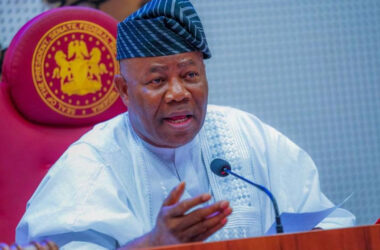In a bold move to stimulate domestic production and foster economic self-reliance, the Nigerian government has officially rolled out its “Nigeria First” policy. This ambitious initiative prioritizes the procurement and utilization of locally made goods and services across various sectors. While the policy has been met with cautious optimism by local manufacturers and service providers, its actual impact on the ground is now under intense scrutiny. Will “Nigeria First” be the catalyst for a thriving domestic economy, or will it face the familiar hurdles that have often hampered similar efforts in the past?
The core tenet of “Nigeria First” is to create a preferential environment for Nigerian businesses. This translates into government agencies and parastatals being mandated to prioritize local sourcing in their procurement processes, provided that quality and pricing are competitive. The policy also aims to encourage private sector actors to embrace locally produced goods, fostering a sense of national pride and contributing to job creation within the country.
For local industries, this policy holds the promise of a significant boost. Manufacturers in sectors ranging from textiles and food processing to construction materials and pharmaceuticals are hopeful for increased demand for their products. Service providers, particularly in areas like engineering, consulting, and technology, also anticipate greater opportunities to secure government contracts and partnerships.
“This policy is a breath of fresh air,” says Chief Adekunle Ogunleye, Chairman of the Lagos-based Manufacturers Association. “For too long, Nigerian industries have struggled to compete with cheaper imports, often at the expense of local jobs and economic growth. ‘Nigeria First’ has the potential to level the playing field and give us the much-needed impetus to expand production, invest in innovation, and create employment for our teeming youth.”
However, the success of “Nigeria First” hinges on several critical factors. One key aspect is the consistent and transparent implementation of the policy across all government levels. Loopholes and inconsistent application could undermine its effectiveness and lead to disillusionment among local businesses. Furthermore, the competitiveness of local industries remains a crucial consideration. While the policy aims to create demand, Nigerian manufacturers must also ensure that their products meet quality standards and are priced competitively with imported alternatives. This requires ongoing investment in technology, skills development, and efficient production processes.
Another potential challenge lies in ensuring that the policy does not lead to artificial price inflation or the creation of monopolies. Safeguards need to be put in place to encourage healthy competition among local producers and prevent the exploitation of preferential treatment. Consumer awareness and acceptance of locally made goods will also play a vital role in the policy’s success. Public campaigns and initiatives to promote the quality and value of Nigerian products could help shift consumer preferences.
The “Nigeria First” policy is undoubtedly a significant step towards fostering local industrial growth. However, its ultimate impact will depend on the government’s commitment to consistent implementation, the ability of local industries to enhance their competitiveness, and the willingness of both public and private sectors to fully embrace locally made goods and services. The coming months and years will be crucial in determining whether “Nigeria First” truly marks a turning point for Nigerian industries and contributes to a more robust and self-reliant economy.
Despite ongoing efforts by the government and the Central Bank of Nigeria (CBN) to stabilize the national currency, the Naira continues to experience significant volatility in the parallel (black) market. This persistent pressure underscores the complex interplay of economic policies, market sentiment, and underlying structural issues affecting the Nigerian economy. The wide disparity between the official exchange rate and the black market rate remains a major concern for businesses and individuals alike.
Recent weeks have witnessed further fluctuations in the black market rate, often triggered by policy announcements, shifts in foreign exchange supply, and speculative activities. While the official exchange rate has remained relatively stable, the parallel market continues to reflect a different reality, driven by unmet demand for foreign currency and a lack of confidence in the official channels.
Several factors contribute to this persistent pressure on the Naira in the black market. One key element is the continued reliance on imports for a significant portion of Nigeria’s consumption and industrial needs. This creates a constant demand for foreign currency, which official channels often struggle to fully meet. The resulting unmet demand spills over into the parallel market, where supply is often limited and prices are driven by scarcity.
Furthermore, the volatility of global oil prices, Nigeria’s primary source of foreign exchange earnings, continues to exert pressure on the Naira. Fluctuations in oil revenues directly impact the country’s foreign reserves and its ability to meet foreign currency demand. Economic policies aimed at diversifying the economy and reducing reliance on oil are long-term goals, and their impact on the exchange rate is not immediate.
The CBN has implemented various measures to manage the exchange rate, including interventions in the official market and restrictions on foreign exchange access for certain imports. However, these measures have had limited success in bridging the gap with the parallel market. Critics argue that some of these policies may inadvertently fuel demand in the black market by creating artificial scarcity in official channels.
The implications of a volatile black market rate are far-reaching. Businesses face uncertainty in their import and export activities, leading to difficulties in pricing and planning. Individuals who rely on foreign currency for various needs, such as education or healthcare abroad, are also negatively impacted by the higher rates. The disparity between the official and black market rates also creates opportunities for arbitrage and rent-seeking, further distorting the economy.
Addressing the persistent pressure on the Naira requires a multi-pronged approach. This includes not only monetary policy measures but also fiscal policies aimed at diversifying the economy, boosting local production, and reducing reliance on imports. Enhancing transparency and efficiency in the official foreign exchange market is also crucial to build confidence and reduce the incentive for individuals and businesses to turn to the parallel market.
Ultimately, stabilizing the Naira and bridging the gap between the official and black market rates will require sustained and consistent economic reforms that address the underlying structural issues affecting Nigeria’s foreign exchange dynamics. Until then, the Naira is likely to remain under pressure, with its black market rate continuing to swing in response to economic policies and market sentiments.
The “Nigeria First” policy and the ongoing challenges with the Naira’s exchange rate highlight the critical importance of focusing on key economic sectors to drive sustainable growth and reduce vulnerabilities. Several sectors hold immense potential for contributing to Nigeria’s economic diversification, job creation, and overall prosperity:
With its vast arable land and significant human capital, Nigeria has the potential to become a major agricultural powerhouse. Investing in modern farming techniques, infrastructure (irrigation, storage), and value-added processing can boost food security, create employment in rural areas, and reduce the need for food imports, thereby easing pressure on foreign exchange.
As emphasized by the “Nigeria First” policy, a thriving manufacturing sector is crucial for job creation, economic diversification, and reducing reliance on imported goods. Providing incentives, improving infrastructure (power, transportation), and streamlining regulations can attract investment and boost local production across various industries.
The burgeoning tech ecosystem in Nigeria, particularly in Lagos, presents a significant opportunity for economic growth and job creation. Supporting startups, investing in digital infrastructure, and fostering a conducive environment for innovation can position Nigeria as a regional technology hub.
Nigeria possesses significant reserves of various solid minerals. Developing this sector responsibly can generate substantial revenue, create employment, and diversify the country’s export base. However, it requires robust regulatory frameworks and sustainable mining practices.
Nigeria’s rich cultural heritage and vibrant creative industries (film, music, fashion) offer significant potential for economic growth and job creation. Investing in tourism infrastructure, supporting local artists and creatives, and promoting Nigeria’s cultural assets can attract both domestic and international visitors and generate revenue.
A targeted and strategic approach to developing these key economic sectors, coupled with supportive policies and a stable macroeconomic environment, is essential for Nigeria to achieve sustainable and inclusive economic growth. The success of initiatives like “Nigeria First” and efforts to stabilize the Naira will ultimately depend on the country’s ability to unlock the potential of its diverse economic landscape.







